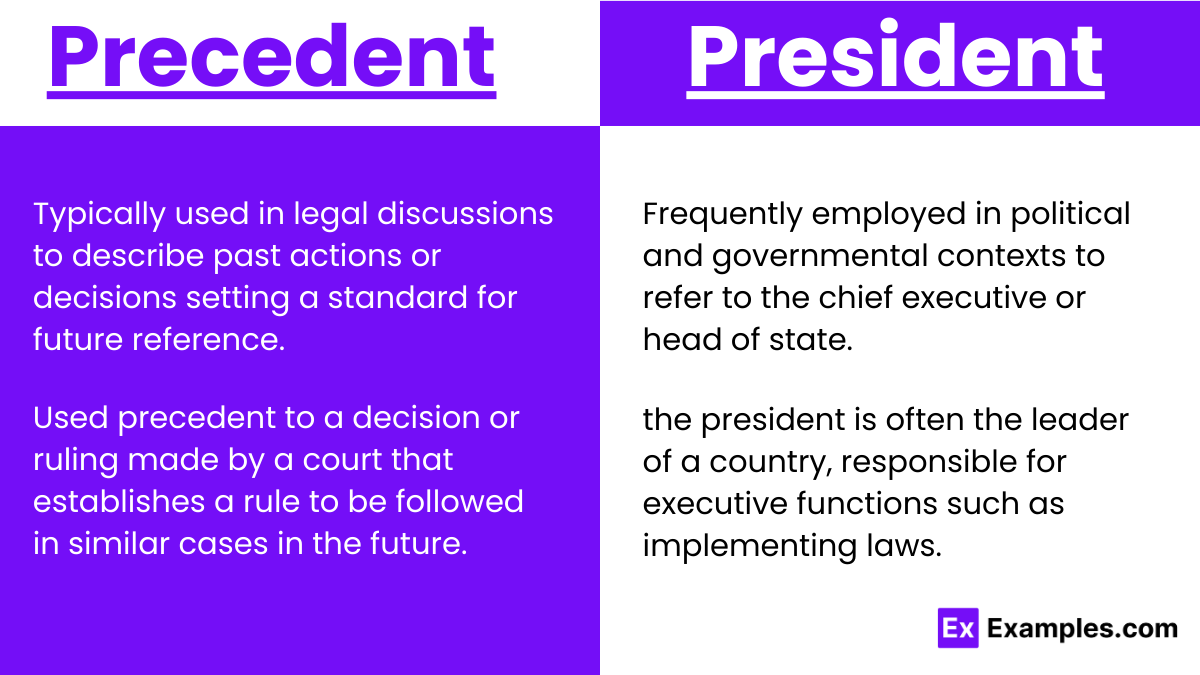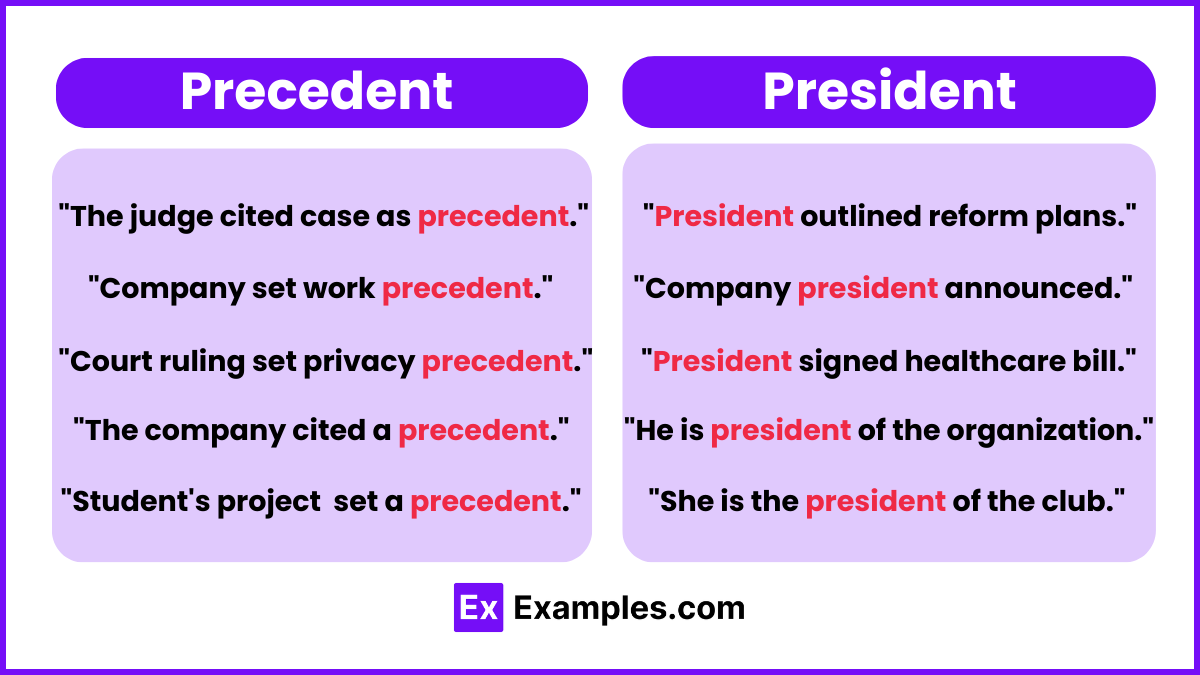Precedent vs President – Difference, Meanings, Usage, Examples
Understanding the difference between ‘precedent‘ and ‘president‘ is crucial in grasping their roles and impact. While they sound alike, they serve vastly different purposes. ‘Precedent‘ refers to a legal guideline set by past decisions, guiding future actions. On the other hand, ‘president‘ denotes the leader of a nation or organization, responsible for executive functions and decision-making. Though similar in spelling, their meanings couldn’t be more distinct.
Precedent and President – Meanings
Both “precedent” and “president” are nouns, but they represent vastly different concepts.
- Precedent refers to a previous event or decision that serves as an example or guide for future similar situations. It establishes a standard or model to be followed.
- President typically denotes the head of a government or an organization, especially in democratic countries like the United States. The president holds executive authority and is responsible for leading and representing the nation.
Summary
“Precedent” This is like a rule or example set by a previous event or decision. It’s a guide for what should happen in similar situations in the future. “President” This is the leader of a country, like the United States. The president is in charge of making important decisions and leading the government. So, “precedent” is about past examples guiding future actions, while “president” is a title for a country’s leader.
How to Pronounce Precedent and President
- Precedent: Pronounced as /ˈprɛsɪdənt/ (PRESS-i-dənt).
- President: Pronounced as /ˈprɛzɪdənt/ (PREZ-i-dənt).
Differences between Precedent and President
| Aspect | Precedent | President |
|---|---|---|
| Definition | Refers to a previous event or decision serving as a guide or standard for future actions or decisions | Denotes the head of a government, organization, or institution, often with executive powers and responsibilities |
| Nature | Relates to past events or actions influencing current practices or beliefs | Signifies a position of leadership or authority, typically within a governmental or organizational context |
| Usage | Typically used in legal, historical, or organizational discussions to describe past actions or decisions setting a standard for future reference | Frequently employed in political and governmental contexts to refer to the chief executive or head of state |
| Application | Describes events or decisions that serve as examples or models for subsequent similar situations | Refers to individuals holding leadership positions, responsible for guiding and representing their respective entities |
| Common Contexts | Found in discussions related to legal precedents, historical influences, or organizational practices | Often used in political discourse, governmental affairs, or discussions about organizational leadership |
How to Remember the Difference between Precedent and President
- Precedent: Think of “pre” in precedent as referring to something that comes before, indicating its connection to past events or decisions.
- President: Focus on the “pres” in president, which denotes a position of leadership or authority.
How to Use Precedent and President

Precedent Usage
- Legal Usage: In law, precedent often refers to a decision or ruling made by a court that establishes a principle or rule to be followed in similar cases in the future.
- Setting a Precedent: When a court makes a ruling that sets a precedent, it means that the decision becomes a reference point for future cases with similar circumstances.
- Precedent in Business: In business, companies may look to precedents set by industry leaders or successful competitors when making strategic decisions or setting policies.
- Personal Relations: Individuals may also use precedents in their personal lives, such as referring to past experiences or actions as a guide for current decisions or behaviors.
President Usage
- Political Role: In a political context, the president is often the leader of a country, responsible for executive functions such as implementing laws, representing the nation domestically and internationally, and commanding the armed forces.
- Organizational Leadership: In organizations, the president is commonly the highest-ranking officer, overseeing the overall operations and often serving as the primary spokesperson or representative.
- Election: In democratic systems, the president is typically elected by the people or appointed through a specific process outlined in the organization’s or country’s constitution.
- Term Limit: Many presidential positions have term limits, restricting the number of consecutive terms an individual can serve in office to ensure regular turnover and prevent excessive concentration of power.
Examples – Precedent and President

Precedent Examples
- The court’s decision set a precedent for future cases.
- Using past rulings as a precedent, the lawyer argued his case.
- This action could establish a dangerous precedent.
- The committee referred to existing precedents to guide their decision.
- The precedent for such behavior is well-established.
President Examples
- The president addressed the nation in a televised speech.
- As president, she oversaw major policy changes.
- The president of the club organized a successful event.
- The company’s president announced a new product launch.
- He was elected president of the student council.
Synonyms
| Noun | Synonyms |
|---|---|
| Precedent | Example, model, standard |
| President | Leader, chief executive, head of state |
Exercise
- The ________ set by the Supreme Court in previous cases guides legal decisions.
- The ________ of the United States delivered a speech addressing the nation’s economy.
- Lawyers often refer to past ________ to argue their cases effectively.
- The ________ of the company announced a new initiative to promote diversity and inclusion.
- This decision will likely establish an important ________ for future similar cases.
Answers
- precedent
- president
- precedent
- president
- precedent
FAQ’S
What does precedent mean in politics?
Precedent in politics refers to past decisions or actions that establish a standard for current and future practices, guiding government conduct and policy-making.
What is a precedent in government?
A precedent in government is a prior decision, action, or ruling that serves as an authoritative example for similar situations in the future, influencing policy and legal interpretations.
Which president was a precedent?
George Washington, the first president of the United States, set many precedents during his tenure, shaping the role and responsibilities of the presidency.
What is an example of a precedent?
An example of a precedent is the tradition of presidential Cabinet meetings established by George Washington, setting the standard for executive branch decision-making and collaboration.
Why is George Washington considered the precedent president?
George Washington is considered the precedent president for his establishment of fundamental norms and practices, including a peaceful transition of power, which shaped the presidency’s role and influence.


